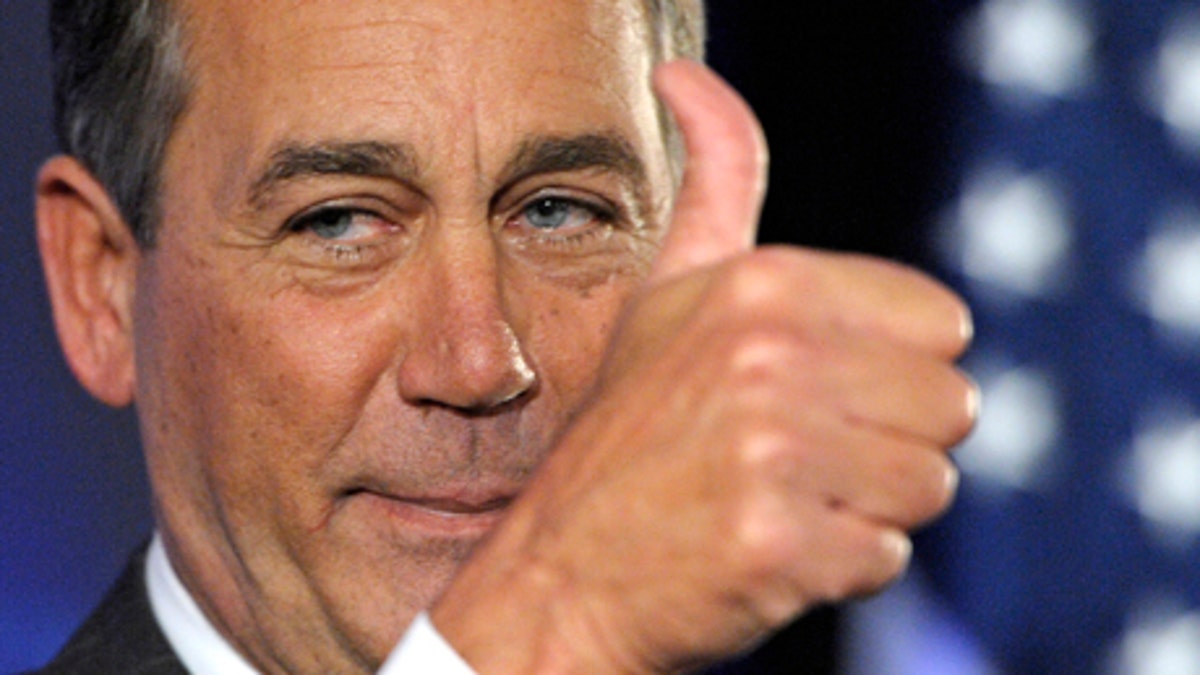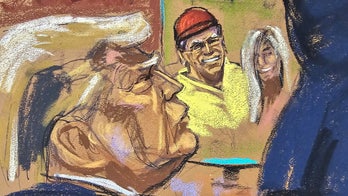
House Republican leader John Boehner of Ohio celebrates the GOP's victory that changes the balance of power in Congress and will likely elevate him to speaker of the House, during an election night gathering hosted by the National Republican Congressional Committee at the Grand Hyatt hotel in Washington, Tuesday, Nov. 2, 2010. (AP Photo/Cliff Owen)
Speculation about the power of angry voters this year can be put to rest as opposition Republicans delivered a stinging blow to President Barack Obama, capturing control of the House of Representatives but falling just short of taking full control of the Senate.
Latino Republicans achieved a number of historic milestones: in New Mexico, Susana Martínez became the first Latina governor in U.S. history; in Nevada, Brian Sandoval became Nevada's first Hispanic governor; and in Florida, Marco Rubio became the second Latino in the U.S. Senate.
The Republican gains usher in an era of divided government for the United States. Obama will have to deal with a more conservative Congress, which will include members of the antiestablishment tea party movement.
More generally, the results reflected Americans' frustrations with the weak U.S. economy and disillusionment with Obama, who was swept into office two years ago on a message of hope and change.
Republican John Boehner, destined to replace Nancy Pelosi as House speaker, called the results "a repudiation of Washington, a repudiation of big government and a repudiation of politicians who refuse to listen to the people."
House Republicans captured at least 220 seats and were leading in 20 other races. They needed 218 seats for control of the House. Republicans have had a net gain of 53 seats and were leading for another 13 Democratic-held seats. If current trends hold, Republicans could record their largest gains in the House in more than 70 years.
In the Senate, Republicans won at least six Senate seats now held by Democrats. Among the victories was Obama's old seat in Illinois, captured by a congressman, Rep. Mark Kirk.
But Democrats won the biggest single race, with Senate Majority Leader Harry Reid defeating Sharron Angle, a favorite of the tea party movement. Democrats also won seats targeted by Republicans in California and West Virginia.
Republicans needed to pick up 10 seats to take control of the 100-seat Senate.
The Republican gains will complicate Obama's ability to enact his proposals during the next two years and possibly force him to fight off attacks on health care legislation and other bills already signed into law.
Although international affairs had little role in the campaign, Obama's global agenda also would be affected in areas such as arms control and climate change.
Obama scheduled a news conference for Wednesday to discuss the election outcome. Before the first results came in, Washington already was buzzing with speculation about whether Republican gains would lead to gridlock or attempts to find common ground, and how they would affect Obama's prospects for re-election in 2012.
Besides the congressional vote, Republicans were making gains in the 37 governors' races before voters Wednesday, capturing at least eight governorships from Democrats and several state legislatures. Those races were especially important as states conduct the once-a-decade task of redrawing congressional districts.
The elections were the biggest test yet for the tea party movement, an amorphous series of groups angered by what they see as the excessive growth of government.
They won some big victories. Rand Paul, son of former presidential candidate Ron Paul, won the Senate seat in Kentucky, despite Democratic claims he was too extreme politically. Another candidate backed by the movement, Marco Rubio, won in a three-way Senate race in Florida. Nikki Haley, an Indian-American, won the South Carolina governorship.
The tea party, though, may have prevented Republicans from picking up the Delaware seat long held by Vice President Joe Biden. Christine O'Donnell, a tea party favorite whose outlandish remarks won her national attention, was defeated by Democrat Chris Coons. O'Donnell shocked the political establishment by winning the party nomination from a veteran congressman who had been heavily favored to beat Coons.
The Republican gains reflected Obama's drop in popularity. Although the president was not on the ballot, Republicans campaigned against his policies, while some Democrats distanced themselves from him. Republicans capitalized on voter anxiety about high unemployment and a rising federal deficit.
Four in 10 voters said they are worse off financially than they were two years ago, according to preliminary exit poll results and pre-election polls. Those who cast ballots expressed dissatisfaction with Obama as well as the two political parties.
Democrats blamed the policies of Obama's predecessor, Republican George W. Bush, for the weak economy and said Obama's policies prevented a financial catastrophe. But it proved difficult to campaign on the message that things could have been worse. Independents and other voters who had supported Democrats in 2008 shifted to Republicans.
"I will honestly say that I voted for him two years ago," said Sally McCabe, of Plymouth, Minnesota. "And I want my vote back."
Obama gave a series of radio interviews pleading with Democratic supporters not to sit on the sidelines. "I know things are still tough out there, but we finally have job growth again," he said in one.
All 435 seats in the House were on the ballot, plus 37 in the Senate. Besides the gubernatorial and state legislative races, voters considered ballot measures in 37 states. A proposal in California to legalize recreational marijuana was defeated.
Some of the biggest states elected governors, including California, where Democrat Edmund G. Brown Jr. defeated Meg Whitman to return to the office he left more than a quarter-century ago. In New York, Andrew Cuomo won the office his father held for a dozen years.
The Associated Press contributed to this article.
America's Election HQ Midterm 2010 Map
Follow us on twitter.com/foxnewslatino
Like us at facebook.com/foxnewslatino




